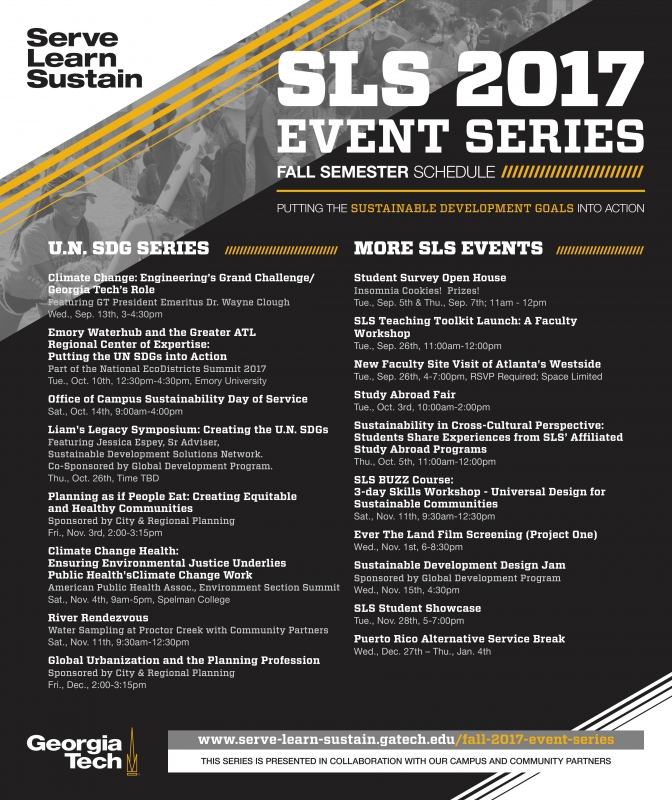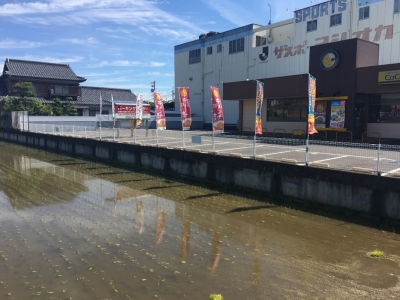This spring, SLS launched its Global Student Ambassador Program, partnering with six Summer 2017 Study Abroad programs at Georgia Tech: France LBAT, Germany LBAT, Spain LBAT, Leadership for Social Good (Eastern Europe), Design Develop Build Program (Ghana), Japan Summer Program in Sustainable Development, and …
Check out our Fall Semester calendar here.
Serve-Learn-Sustain is proud to announce the official launch of our 2017-18 U.N. SDG Series! The SDGs are the U.N. Sustainable Development Goals, adopted by U.N. member states in 2015 as a new set of global goals for sustainable development that will: “end poverty, protect the planet, and ensure prosperity for all” (http://www.un.org/sustainabledevelopment/takeaction/).
I especially encourage you to attend some of our opening events to see what the series is about, especially:
- THIS WEEK - Climate Change: Engineering’s Grand Challenge/Georgia Tech’s Role, featuring GT President Emeritus Dr. Wayne Clough (Sept. 13, 3pm)
- Liam’s Legacy Symposium: Creating,…
Exciting things are happening with Georgia Tech's Living Building - check out what's been going on over the summer!
The Living Building Equity Goals and the Equity Petal Work Group, headed by Serve-Learn-Sustain's Director, Dr. Jennifer Hirsch.
Six Pilot Projects for the Living Building that provide opportunities for student involvement.
The work of the Energy Petal…
SLS is excited to announce our Fall 2017 Event Series! Check out the schedule on our Events page and stay tuned for more detailed information! Mark your calendars!

With Phase II registration in progress, SLS would like to highlight three exciting affiliated courses! HTS 2803: Special Topics – Environmental Sociology, Instructor: Kate Pride Brown; LMC 6312: Technology, Representation and Design (“Data Walks”), Instructor: Yanni Loukissas; MGT 4803: Sustainable Marketing, Instructor: Dionne Nickerson. Check out these courses, and the rest of our Fall 2017 course offerings on our Courses page.
HTS 2803: Special Topics – Environmental Sociology Instructor: Kate Pride Brown
The Georgia Tech students who affiliate with programs like Serve-Learn-Sustain are world-savers. With passion and dedication, they will be the ones who design a better solar battery, envision sustainable logistical systems,…
Serve-Learn-Sustain was pleased to co-host this year's INSS Conference on Smart, Connected Communities with the Institute for People and Technology (IPaT) and Civic Data Science this past June. Check out this article by Alyson Powell, one of IPaT's Communications Officers, with her perspective on the conference.
Alyson Powell serves as a Communications Officer for IPaT, assisting with copywriting and marketing IPaT through the creation of marketing materials such as videos, newsletters, and graphics. She brings nearly 15 years experience in marketing, web development, and broadcasting to her position.
In June 2017, The Center for Serve-Learn-Sustain partnered with IPaT and Civic Data Science to host a satellite conference as part of the Integrated Network for Social Sustainability (INSS). The multi-site conference with the theme of "Smart, Connected Communities," focused on smart cities and data for sustainable communities. Carl DiSalvo, SCCC Fellows Program Faculty Co-Director, presented a Smart Cities panel discussion, which built on the work of the Smart Cities, Connected Communities Fellows program. For additional INSS resources, please see our resources page.
Read additional reflections by our SCCC Fellows.
Rethinking the City in Smart Cities,…
In June 2017, The Center for Serve-Learn-Sustain partnered with IPaT and Civic Data Science to host a satellite conference as part of the Integrated Network for Social Sustainability (INSS). The multi-site conference with the theme of "Smart, Connected Communities," focused on smart cities and data for sustainable communities. Carl DiSalvo, SCCC Fellows Program Faculty Co-Director, presented a Smart Cities panel discussion, which built on the work of the Smart Cities, Connected Communities Fellows program. For additional INSS resources, please see our resources page.
Read additional reflections by our SCCC Fellows.
Rethinking the City in Smart Cities,…
We are pleased to provide you with the third in a series of blog posts from our 2017 SLS Global Student Ambassadors. As one of the Ambassadors, participating in the Japan Summer Program in Sustainable Development, Emma Browning, provides a perspective on sustainability in a rural area of Japan (Ogaki City) versus a metropolitan area of Japan (Tokyo).
Ogaki City: Rural Sustainability

A fast food curry restaurant situated next to a rice paddy in Ogaki City. Compared to Tokyo, Ogaki has a great deal more agriculture coexisting with its more modern shopping and entertainment - it’s difficult to walk anywhere within the city without stumbling across a rice field or a community garden. This mix of traditional and contemporary keeps the environment in constant focus rather than brushing it off as a vague, irrelevant…
This spring, SLS launched its Global Student Ambassador Program, partnering with six Summer 2017 Study Abroad programs at Georgia Tech: France LBAT, Germany LBAT, Spain LBAT, Leadership for Social Good (Eastern Europe), Design Develop Build Program (Ghana), Japan Summer Program in Sustainable Development, and Sustainable Transportation Abroad (Netherlands). The Global Student Ambassador Program is designed to…